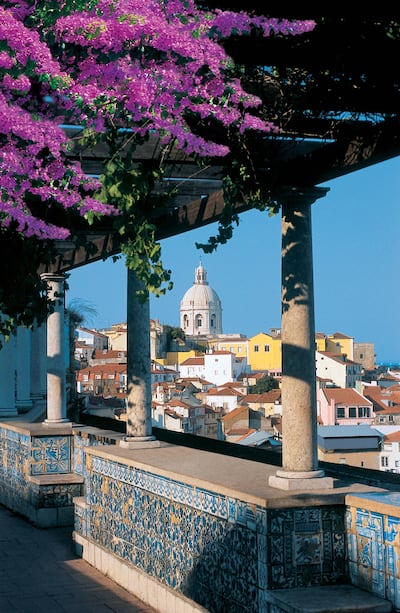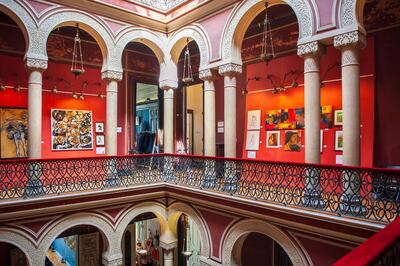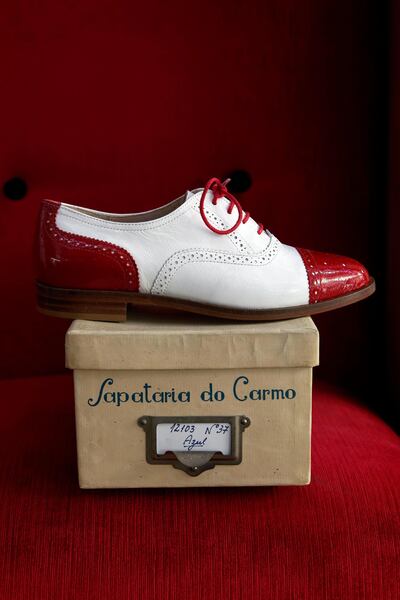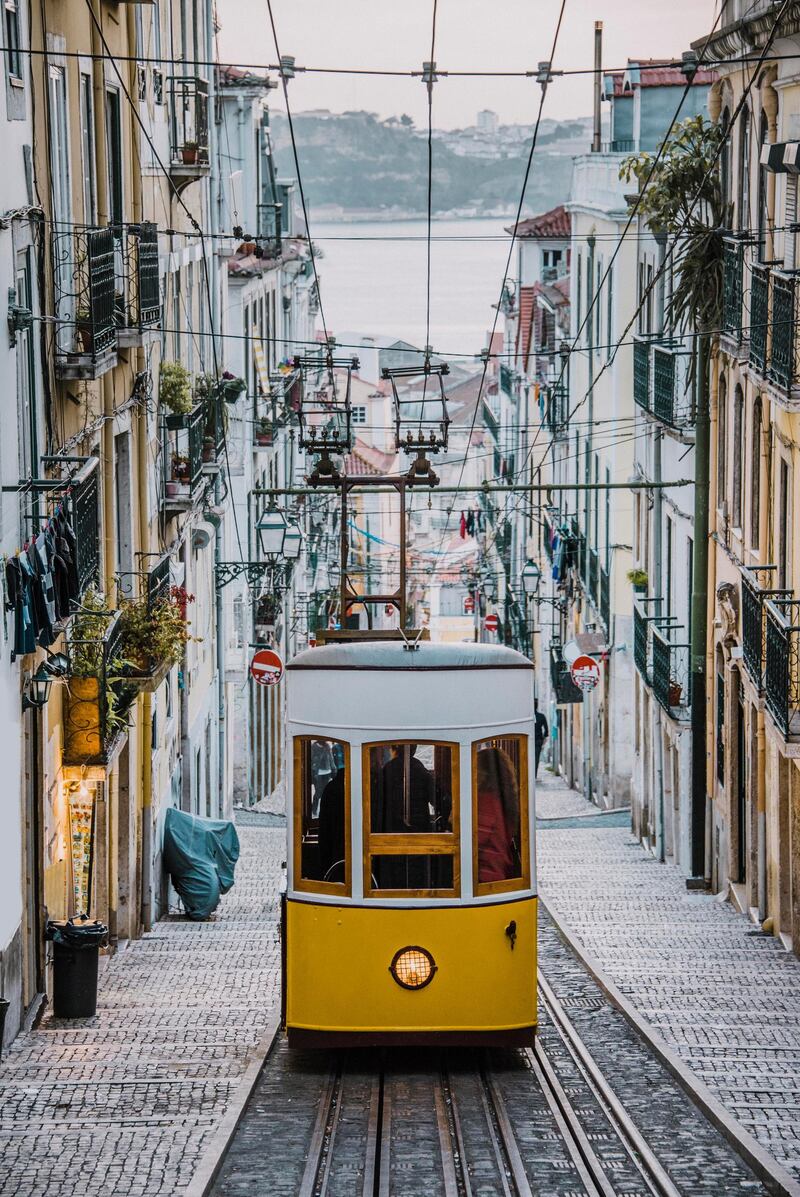Poised on the brink of becoming flooded with tourists as more people discover what a brilliant bargain it is, Lisbon is a city to visit sooner rather than later.
Shabbily chic but still ridiculously beautiful, Lisbon was once the richest city in the world. At present, its grand 18th-century squares, and pistachio and pink former palaces and mansions are undergoing an extensive restoration. Scaffolding is everywhere; the sound of drilling ubiquitous.
Hunting for bargains
Local residents in Portugal’s lovely little capital complain about the high taxes introduced in the wake of the 2008 financial crisis. But for many foreign visitors, prices are a steal. That goes for the city’s excellent five-star hotels and top-class restaurants, as well as its cheerful neighbourhood eateries, where an espresso costs Dh4 and the famous pasteis de nata custard tarts about Dh5.
Not only does Lisbon have some of the loveliest city hotels in Europe at the lowest prices – the grand Four Seasons Ritz, for instance, is one of the least expensive of the brand's properties anywhere in the world – but the bonus, too, of beautiful beaches at Cascais, just a 25-minute train ride along the coast.
On top of all that, the shopping is a delight. New fashion and homeware stores are proliferating as foreigner investors buy up old buildings to turn them into new shops, hotels and apartments. But Portugal’s traditional handmade goods make the best buys. The city’s steep streets are still dotted with old-fashioned shops selling old-fashioned goods at such old-fashioned prices you’ll wish you’d brought a bigger case.

No trip would be complete without a ride on one of the city’s clanking yellow wooden trams. However, nothing’s better for orientating yourself in Portugal’s sunny little capital – especially on a summer’s morning with a breeze blowing in from the Atlantic – than riding on the back of a vintage 1940s motorbike, or in its sidecar, with 57-year-old guide Joao de Lemos Soares, one of the founders of Sidecar Touring. He’ll drive you up and down Lisbon’s steep little streets, then along the waterfront to Belem to stop for coffee and cake.
Soares lost his life savings when three of Portugal’s banks collapsed in the wake of the 2008 financial crisis, and now delivers a cogent political critique of the city’s recovery, as well as warnings against the Eastern European pickpockets who also like to squeeze on to the famous trams. “Unbelievably skilled!” he cautions.
Head out on foot
When it comes to shopping, this is a city to explore on foot, its hilly, marble-cobbled streets best tackled in flat, comfortable, ridge-soled shoes. The city has four main shopping areas, each bearing testimony to the wealth Portugal accumulated after its 15th-century explorer Vasco da Gama discovered fast sea routes to India and South America. Thanks to him, Portugal so dominated trade in gold and silver, silks, spices and precious stones that it was able to take the devastating earthquake of 1755, which reduced most of Lisbon to rubble, almost in its stride. It was rebuilt on a wildly lavish scale.
Long, broad, tree-lined Avenida da Liberdade, the grandest boulevard, is home to most of the city’s expensive international boutiques – Gucci and the like. Below that lie the great squares and then the narrow streets of Baixa, laid out after 1755 on a grid system, and running down to the waterfront. Here you’ll find the city’s best old delis and can pause to inhale the rich fragrance of 19th-century purveyors of coffee, olive oil and Portuguese cheeses.
Above Baixa lie the elegant old streets of Chiado, where some of the city's most beautiful stores sell from the same glass-fronted cabinets that they used to serve customers from in the 18th and 19th centuries. Above that, and reached by funicular or street elevator, is Principe Real. Here, dotted among crumbling old mansions restored to house stylish boutiques such as Amélie au Théâtre, and fashion, design and homeware concept stores such as Embaixada, traditional patisserie/restaurants such as Cister offer a toasted cheese sandwich for Dh10, and the odd old-fashioned purveyor of the handmade, such as Principe Real Linens, survives.

The fortune of this particular enterprise was ensured the day 70 years ago that the hyper-wealthy owner of L'Oréal, Liliane Bettencourt, visited, and subsequently recommended the store to friends such as Jacqueline Kennedy Onassis and Queen Elizabeth II. "The queen of the Netherlands was here last week," the owner tells me.
Made in Portugal: what to buy where
Gloves, hats and shoes
In Chiado, the tiny Luvaria Ulisses, on Rua do Carmo since 1925, sells hand-stitched, cashmere-lined leather and suede gloves in myriad colours from Dh185. For classic men's hats, caps and berets, the family-run Chapelarias Azevedo Rua, founded in 1886, is the place to go. Portugal's shoe factories manufacture for the very top French and Italian fashion houses, but increasingly sell their own brands, including Moskkito and Guava (used by Versace in its recent shows). Opened in 1904, Sapataria do Carmo stocks classic men's brogues.

Soaps and candles
Claus Porto, Portugal’s oldest soap and fragrance maker, was founded in 1887, and now also has a store in New York. It sells its exquisitely fragranced Dh37 soaps and hand creams in delectably printed wrapping. Benamôr 1925 has been famous in Portugal for its soaps and skin creams since it was established in the 1900s. The striking lime and purple packaging of its Alaintoine miracle hand cream and Jacaranda soaps make them almost too pretty to unwrap. At Caza del Vellas Loreto, which was founded in 1789, the candles scented with pomegranate, lavender or rosemary, are handmade by the eighth generation of the founding family.
Handmade linen, porcelain and jewellery
Finely woven hand-embroidered linens, a Portuguese tradition, have been found in royal trousseaus for centuries, and are still made into delicate baby clothes, napkins, aprons, tablecloths and bed linen. Teresa Alecrim and the glorious Paris em Lisboa, deeply redolent of the 19th century in its 1888 Art Nouveau store opposite Hermès and the 1905 Café a Brasileira, are lovely. Best, though, is the aforementioned Principe Real Linen, in Principe Real, where customisation rules. Any colour or design of embroidery can be ordered for tablecloths, bed linen and baby clothes. Linen pillowcases cost Dh41 to Dh185. For gilded, hand-painted Portuguese porcelain (as used in the White House), Vista Alegre has been famous since the 1820s. Costa Nova is its only rival. And for antique jewellery, the place to visit is Leitão & Irmão, appointed crown jewellers in 1875.
Traditional crafts
Burel Factory has revived Portugal's tradition of felting wool to produce wonderfully warm and richly coloured blankets and throws, with intricately stitched cushion covers on offer from Dh78. By Stro sells finely woven linen scarves for Dh123. Tiles old and new are the speciality of Cortiço & Netos. And set up to showcase and sustain traditional Portuguese crafts and produce of all types, the A Vida Portuguesa stores have been a massive success since their launch in 2013.
Oils, cheeses and sardines
Manteigaria Silva, still operating in the Baixa premises it opened in 1890; Manuel Tavares; the gourmet floor in Lisbon's sole department store, El Corte Ingles; Confeitaria Nacional; and Conserveira De Lisboa, a new enterprise with marvellously colourfully packaged tins of sardines, are the essential spots.
Where to stay
Countless hotels have opened in the last decade as old buildings have been renovated, but staying high up above the city is best, so you can enjoy the view. On the edge of Edward VII park and near the Calouste Gulbenkian museum, the Four Seasons Hotel Ritz Lisbon not only displays Portuguese art, but also has peerless service and food in its Varanda restaurant. There's an outdoor pool currently under construction, so if you like to sleep late, ask for a room unaffected by the daytime sound of drilling. Double rooms this summer from Dh2,550.





